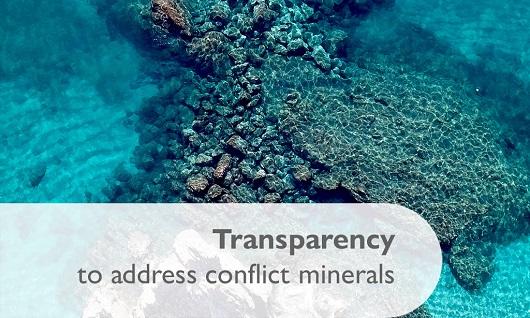GRI & RMI to Improve Minerals Sourcing Due Diligence & Reporting

GRI and the Responsible Minerals Initiative kicked off an exciting project today at the OECD 2018 Forum on Responsible Mineral Supply Chains. The first meeting of the GRI Corporate Leadership Group for conflict minerals brought together a highly accomplished expert group, which aims to provide the reporting community with consolidated reporting guidance based on existing internationally-recognized tools and frameworks.
Earlier in April 2018, GRI and the Responsible Minerals Initiative (RMI) announced a project to help improve companies’ minerals sourcing due diligence and impact reporting by providing reporting resources and tools based on internationally recognized frameworks.
Increasingly, governments and other stakeholders recognize the need to prevent the extraction and trade of minerals with significant adverse impacts, including serious human rights abuses and conflict. The increased attention has prompted many companies to establish due diligence management systems and publicly report on their practices. Meaningful and comparable data help companies identify their gaps, and promote accountability and transparency in the minerals supply chain. However, despite international guidance and regulations, public reporting by companies remains limited, and the quality and comparability of existing reports presents opportunities for improvement.
The project aims to provide the reporting community with a consolidated reporting resource based on existing internationally-recognized tools and frameworks, such as the OECD Due Diligence Guidance for Responsible Supply Chains of Minerals from Conflict-Affected and High-Risk Areas. The outcomes can support companies to improve regulatory compliance and further enable companies to make informed decisions about potential conflict minerals in their supply chains.
Collaboration for Improved Disclosure
The RMI is one of the most widely used resources for companies from multiple industries to address minerals due diligence challenges in their supply chains, and GRI’s reporting standards, developed through robust stakeholder consultative processes, is the most trusted by companies and governments worldwide. The RMI and GRI share a commitment to the responsible sourcing of minerals from conflict-affected and high-risk areas and are collaborating to improve the quality of due diligence and impact reporting. “By leveraging the due diligence expertise of our Responsible Minerals Initiative and the reporting expertise of GRI, we can refine approaches and offer new tools that will greatly enhance the risk management and transparency efforts of companies,” said Rob Lederer, Executive Director of the Responsible Business Alliance.
“As companies face increasingly stringent reporting expectations from governments, shareholders and others regarding minerals sourced from conflict-affected and high-risk areas, this RMI-GRI project is not only timely but crucial for companies trying to meet market and regulatory expectations,” according to Tim Mohin, Chief Executive of the Global Reporting Initiative.
Current Activities
After an inception phase, in which the RMI and GRI conducted extensive research to understand stakeholder expectations and define the landscape and urgency of the issue, the project is now entering phase 2: Corporate Leadership Group. In this phase the RMI and GRI will invite companies to discuss research findings from Phase 1, to develop a common understanding how existing tools and frameworks serve companies, discuss best practices and how identified gaps can be addressed with additional reporting resources on responsible minerals sourcing.
Based on the outcome of Phase 2, the RMI and GRI will develop a consolidated reporting resource for responsible minerals sourcing reporting, and inform the Global Sustainability Standards Board (GSSB), the body in charge of developing and approving GRI standards.
For more information about the project, download this overview.

